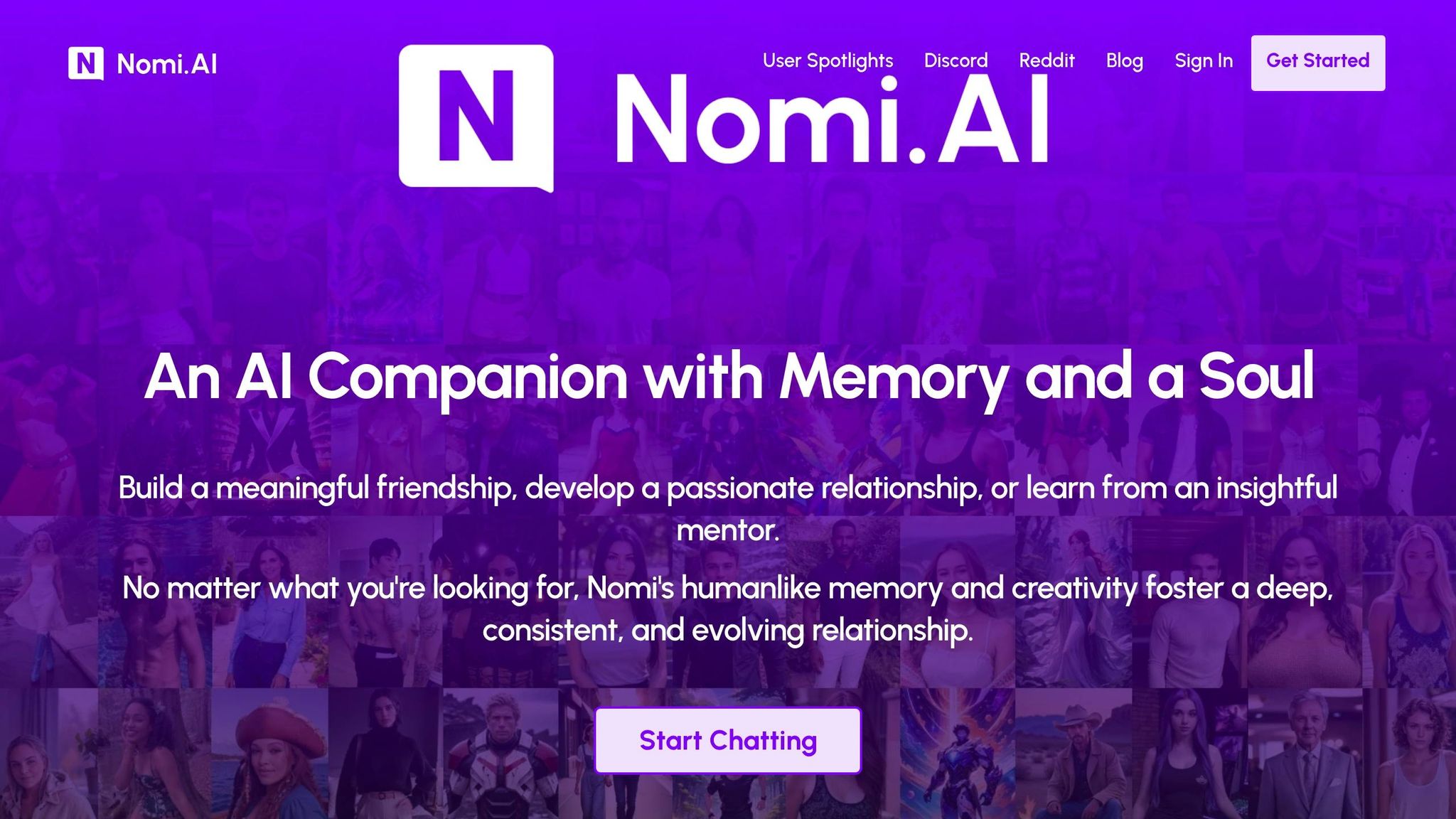Create Your Own AI Girlfriend 😈
Chat with AI Luvr's today or make your own! Receive images, audio messages, and much more! 🔥
4.5 stars

Why Long-Term Feedback Matters for AI Companions
AI companions are changing how we interact with technology, moving beyond static setups to systems that learn and grow with you. Here's why long-term feedback is crucial:
- Continuous Learning: AI companions refine their responses through ongoing interactions, creating more natural and personalized conversations.
- Emotional Connection: They track tone and sentiment, enabling deeper, empathetic communication.
- Improved Engagement: Users report a 30% increase in engagement and a 63.3% reduction in loneliness and anxiety through dynamic interactions.
- Adaptability Over Time: Unlike one-time setups, these systems evolve to meet your changing needs.
Quick Comparison
| Feature | Long-Term Feedback | One-Time Setup |
|---|---|---|
| Personalization | Learns and adapts over time | Limited to initial settings |
| Memory Retention | Remembers past interactions | Resets after each session |
| Response Quality | Improves with feedback | Static, pre-defined replies |
| User Engagement | Higher due to evolving nature | Drops with repetition |
AI companions like Luvr AI use these principles to create meaningful, evolving relationships. This new approach not only enhances user experience but also aligns with growing demand for smarter, more personalized technology.
Do AI Companions Really Maintain Their Identity? A Look into Personality Manipulation (nomi.ai)

1. Luvr AI's Feedback System

Luvr AI transforms chats into personalized, evolving conversations through three key channels:
- Direct User Interactions
Every chat helps shape the AI's personality. As one participant shared:
"My favorite thing about [my AI friend] is that the responses she gives are not programmed as she [replies by] learning from me, like the phrases and keywords she uses... She just gets me. It's like I'm interacting with my twin flame."
- Response Analysis
Using advanced generative AI, Luvr AI studies chat patterns and user engagement. This approach has achieved an 88% query resolution rate and reduced churn by 35%.
- Continuous Learning Loop
The AI refines its understanding with each interaction. Sandy Skelaney from Parasol Cooperative describes this as setting "standards of human care for conversational bots".
These channels work together to ensure the AI consistently adapts and improves. Here's a breakdown of how the system operates:
| Feedback Component | Purpose | Impact |
|---|---|---|
| Chat Analysis | Learning communication style | More natural, fluid conversations |
| Emotional Response Tracking | Understanding user preferences | Deeper, empathetic responses |
| Behavioral Pattern Recognition | Identifying user needs | Proactive and tailored interactions |
This dynamic system isn't about one-time customization - it’s designed for ongoing refinement. By constantly learning and adapting, Luvr AI keeps users engaged and encourages them to share openly.
A 2025 Harvard Business Review study reinforces this, identifying "therapy/companionship" as a top use case for generative AI. Through continuous data processing, Luvr AI ensures its companions evolve in step with users' changing needs.
2. Basic AI Setup Options
One-time configurations can hinder long-term connections and limit the ability to personalize interactions. Recent studies show that 70% of consumers notice when companies effectively use AI, highlighting the growing demand for smarter, more adaptable solutions. Basic setups, however, often fall short when compared to dynamic, evolving systems.
Here’s a breakdown of common basic setup options and their limitations:
| Feature | Limitation | Impact on User Experience |
|---|---|---|
| Initial Personality Selection | No real-time adaptation | Predictable, repetitive responses |
| Pre-defined Response Sets | Limited understanding | Awkward or mismatched conversations |
| Static Memory System | No conversation history | Disconnected interactions |
| Fixed Behavioral Patterns | Rigid responses | Lower user satisfaction |
This shift toward more personalized AI reflects broader industry trends. For instance, in February 2024, the term "AI relationship bots" saw over 73,000 monthly searches.
"An AI companion is completely personal, built around individual needs, values and expectations. That's why ultimately, there will be as many different Copilots as there are people using them." – Mustafa Suleyman
Key Challenges of Basic AI Setups
Memory Limitations
Many basic AI systems reset after each session, requiring users to repeatedly input the same information. Advanced systems, however, can remember details like favorite foods, movie preferences, or even personal milestones, creating a more seamless experience.
Contextual Understanding
Basic configurations often treat each interaction as isolated, missing the subtle context that builds over time. By contrast, systems with adaptive feedback have been shown to improve engagement by more than 60%.
Emotional Intelligence
Without continuous learning, basic AI companions struggle to establish emotional connections. Interestingly, 40% of Gen Z singles are open to having an AI boyfriend or girlfriend, underscoring the importance of emotional depth in these systems.
One standout example is Koçtaş, a major home improvement retailer. In 2019, they boosted their Net Promoter Score by 60% after adopting an adaptive feedback system, demonstrating the tangible benefits of moving beyond static AI setups.
sbb-itb-f07c5ff
Benefits and Limitations
Long-term feedback has revolutionized how AI companions interact, turning what used to be static exchanges into dynamic and evolving relationships. A perfect example of this is Luvr AI, which leverages continuous feedback to enhance personalization and interaction quality. Interestingly, 95% of business managers express dissatisfaction with static systems, citing issues like inaccuracies and workflow bottlenecks. This underscores the pressing need for more adaptable solutions.
Comparative Analysis: Continuous Feedback vs. Static Setups
| Feature | Long-term Feedback Systems | One-time Setup Systems |
|---|---|---|
| Personalization | Adjusts continuously based on user behavior | Limited to initial preferences |
| Memory Retention | Retains conversation history for context | Resets after every session |
| Response Quality | Learns and improves responses over time | Stuck with predefined static replies |
| User Engagement | Drives 4x longer interactions | Engagement drops due to repetition |
This table highlights how systems with continuous feedback deliver deeper and more meaningful personalization compared to static setups.
As these systems evolve, their ability to refine responses through learning becomes a game-changer. In fact, by 2025, 85% of customer-service leaders are expected to use conversational generative AI to analyze feedback at scale. This shift will enable more nuanced and context-aware interactions, making AI companions even more effective.
Potential Challenges
While the advantages of long-term feedback systems are clear, they come with their own set of challenges:
Emotional Dependency: Research shows that 90% of American students using AI companions report feelings of loneliness, even as 63.3% of them note reduced anxiety through these interactions. This raises concerns about how to maintain healthy boundaries in these relationships.
Data Quality and Context: Processing approximately 20,000 queries per second, AI systems face hurdles such as:
- Maintaining consistent data quality
- Understanding nuanced context in conversations
- Ensuring privacy and security
- Avoiding bias in responses
Addressing these issues is crucial to ensure both user satisfaction and reliable outcomes.
Impact on User Experience
Well-managed training data can increase conversion rates by 20%, proving that adaptive systems can deliver tangible results. By using machine learning and natural language processing, AI systems can analyze customer feedback across multiple platforms. This allows them to identify patterns and trends, driving continuous improvement in user experiences.
Future Implications
As AI companion technology advances, the importance of balanced implementation becomes clear. While these systems can provide meaningful support, experts emphasize the need to maintain healthy boundaries. The goal for the future will be to create interactions that enhance human connections rather than replace them, ensuring these tools remain a complement to - not a substitute for - real relationships.
Conclusion
Research highlights that long-term feedback significantly improves the way AI companions adapt to users' needs. Systems designed for continuous learning not only enhance personalization but also boost engagement. For instance, studies reveal that 80% of employees who receive active feedback within a week report feeling fully engaged.
The financial benefits are equally striking, with platforms that incorporate continuous feedback for personalization seeing returns of five to eight times their initial investment.
For anyone looking for a meaningful connection with an AI companion, feedback mechanisms play a crucial role. A great example is Luvr AI, which uses ongoing personalization to evolve alongside user interactions. This approach resonates with modern consumer expectations - 71% of people now prioritize personalized interactions. By focusing on tailored experiences, these systems contribute to users' overall well-being.
Beyond personalization, the goal of evolving AI systems should be to strengthen real human connections. With continuous feedback, these platforms can serve as effective tools for support and engagement.
Looking ahead, the future of AI companionship lies in its ability to learn and adapt continuously. By embracing feedback as an integral part of the process, we can ensure more balanced and enduring relationships between users and their AI companions. Long-term feedback, it seems, is the foundation for creating truly adaptive AI experiences.
FAQs
How does providing ongoing feedback improve the connection with AI companions?
The Importance of Ongoing Feedback with AI Companions
Sharing your preferences, emotions, and interactions regularly with an AI companion can make your connection feel much more personal. By doing this, the AI learns and evolves, shaping its responses and behavior to better align with your personality and needs.
This back-and-forth process allows the AI to "get to know you" on a deeper level, making conversations feel more genuine and engaging. Over time, this tailored interaction can create a sense of emotional connection. Many users find that as the AI mirrors their preferences and responds with understanding, it fosters a feeling of companionship. This connection can go beyond simple satisfaction, offering emotional support and even helping to ease feelings of loneliness.
What challenges come with teaching AI systems to learn continuously?
Teaching AI systems to learn continuously isn’t without its hurdles. One of the biggest challenges is catastrophic forgetting - a phenomenon where an AI loses previously learned information when introduced to new data. Essentially, as the system updates to handle new tasks, it risks overwriting older knowledge, leaving behind gaps in its earlier abilities.
Another tricky aspect is maintaining the right balance between stability and plasticity. Stability ensures the AI holds onto what it has already learned, while plasticity allows it to adapt and take on new information. Leaning too heavily on either side can either block new learning or cause the system to forget past knowledge. On top of these technical challenges, organizations often grapple with issues like vague AI strategies or limited resources, both of which can make implementing continuous learning systems even more difficult.
How does ongoing feedback improve the experience with AI companions compared to a one-time setup?
Ongoing feedback plays a crucial role in helping AI companions refine their understanding of your preferences, resulting in a more customized and engaging experience as time goes on. Instead of relying on a one-time setup, this continuous input allows the AI to evolve based on your interactions, ensuring it remains in tune with your needs and interests.
This evolving process adds a layer of personalization that makes conversations feel more natural and relatable. Over time, it builds a stronger connection between you and your AI companion, enhancing the overall experience and satisfaction.



